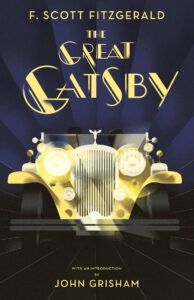“In my younger and more vulnerable years my father gave me some advice that I’ve been turning over in my mind ever since. ‘Whenever you feel like criticizing any one,’ he told me, ‘just remember that all the people in this world haven’t had the advantages that you’ve had’.”
The Great Gatsby is by far the ultimate ‘Great American Novel.’
It was first published in 1925, the novel was a complete failure. Fewer than 20,000 copies were sold in its first year, despite many famous authors praising it. At the time of Fitzgerald’s death, the novel was almost entirely unknown. Today, it’s his greatest achievement.
Schools and libraries regularly challenge the novel for its bad language to its anti-Semitic stereotypes. It’s a cautionary tale set in the Roaring Twenties at the height of glitz and glamour and has been adapted into many plays, films, and ballets.
Summary
The story follows Nick Carraway, a war veteran hoping to get into the bonds business after moving to New York. There, he meets his beautiful cousin, Daisy Buchanan, as well as his eccentric reclusive neighbour, Jay Gatsby. Nick takes an instant dislike to Daisy’s brash and loud husband, Tom, and a keen shine to famous golf player Jordan Baker. As all their lives become hopelessly entwined, Nick starts to realise the past that Gatsby and Daisy share as well as the possible dangers in their future. The Jazz Age throws them together as well as pulls them apart and eventually ends their relationship in tragedy.
Commentary
The Great Gatsby is widely regarded as one of the greatest books ever written and for good reason too.
The novel is beautifully tragic and bittersweet. Fitzgerald captures the Roaring Twenties with startling clarity. They were a time of affluence, alcohol and parties, but also an era of loneliness and apathy. It’s a story of disillusionment with dreams and wealth and shows the destructive outcome of chasing the ‘American Dream’. It’s still relatable today. A world where money is valued more than human life and materialism glitters at every corner. The never-ending search for happiness and recognition, a search that ends in disaster.
The society shown is superficial and materialistic. Everything from illegal alcohol to huge parties to Daisy crying over beautiful shirts reveals just how shallow the people are. It’s a society built on who you know rather than what you know, and the betrayals and gossip are sickening. Most of the characters are egotistic and self-centred, and it is this frivolous attitude that causes their demise.
The start of The Great Gatsby is slow-burning. It takes a while for the book to reveal the main plot, as well as the major motivation behind each character’s actions. When the novel does begin to pick up towards the middle and end, the action comes quickly and suddenly and leaves the reader reeling from the shock of what happens.
The characters are incredibly well developed and each has their own past, motive, and ideals. Daisy plays the role of an airhead beauty but desperately wants to protect her daughter. Gatsby appears as a carefree millionaire but has a shady past. Even Myrtle, an innocent young woman trying to escape a loveless marriage has darker reasons for her actions. The characters are entirely unpredictable which only contributes to their realism. However, Fitzgerald displays quite a lot of Jewish stereotypes in a negative way. The character of Meyer Wolfsheim is very anti-semitic, right down from his appearance to his personality. This is a major cause of the novel itself being challenged.
Recommendations
Overall, I’d give F. Scott Fitzgerald’s The Great Gatsby four out of five stars. It’s by far one of the greatest classics of the twentieth century. I’d recommend this book to everyone, whether you enjoy classics or not. Although it’s a compulsory novel in a lot of schools, it’s definitely worth rereading by yourself as it’s a brilliantly told story with a bittersweet ending.

Want to read it for yourself? You can find it in:
Prefer to listen to it instead? You can find it on:
